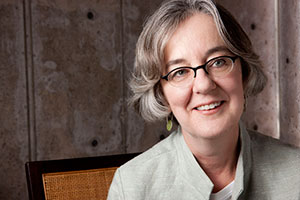
April 29, 2015
LA JOLLA—The National Academy of Sciences (NAS) recently announced that Salk Institute Professor Vicki Lundblad is one of 84 new members to be elected to the NAS. The election is considered one of the highest honors accorded a U.S. scientist. Lundblad’s recognition brings the number of Salk faculty elected to the NAS to 14.

Vicki Lundblad
Image courtesy of Salk Institute for Biological Studies
Lundblad, the Becky and Ralph S. O’Connor Chair and professor in the Molecular and Cell Biology Laboratory, seeks to understand how the ends of chromosomes determine how many times a cell can divide. Her early work showed that these chromosome termini, called telomeres, act as a cellular time-keeper, by losing DNA sequence with each cell division. Fortunately, there is a way around this countdown: an enzyme called telomerase rebuilds these eroding telomeres and allows cells to divide indefinitely. Lundblad’s group pioneered the discovery of the key subunits that make up this telomerase enzyme, using the yeast Saccharomyces cerevisiae—the same yeast used to make wine and bread—as their experimental system. This simple single-celled organism has also allowed Lundblad and her colleagues to subsequently uncover numerous insights about what dictates when and where telomerase acts inside the cell.
Lundblad’s work also laid the groundwork for comparable studies in human cells. Normal human cells have very low levels of telomerase, which limits their cell division potential. Since lungs, skin, liver and other organs must be replenished by newly divided cells, the resulting eventual block to cell division due to eroding telomeres contributes to the aging process. In contrast, greatly elevated levels of telomerase drives the unregulated cell growth exhibited by cancer cells. Recent work by Lundblad’s group has uncovered a novel mechanism that may “fine-tune” telomerase, to keep it at levels that ensure healthy cell division but are not sufficient for the rampant cell growth that characterizes cancer.
About the Salk Institute for Biological Studies:
The Salk Institute for Biological Studies is one of the world’s preeminent basic research institutions, where internationally renowned faculty probes fundamental life science questions in a unique, collaborative, and creative environment. Focused both on discovery and on mentoring future generations of researchers, Salk scientists make groundbreaking contributions to our understanding of cancer, aging, Alzheimer’s, diabetes and infectious diseases by studying neuroscience, genetics, cell and plant biology, and related disciplines.
Faculty achievements have been recognized with numerous honors, including Nobel Prizes and memberships in the National Academy of Sciences. Founded in 1960 by polio vaccine pioneer Jonas Salk, MD, the Institute is an independent nonprofit organization and architectural landmark.
Office of Communications
Tel: (858) 453-4100
press@salk.edu